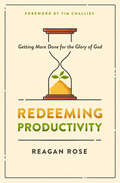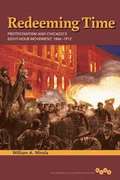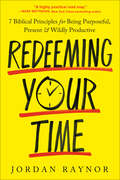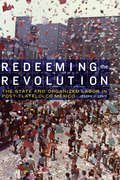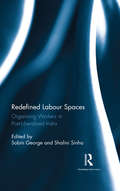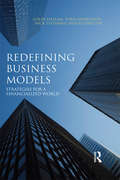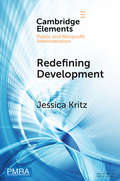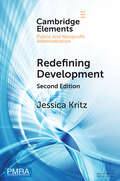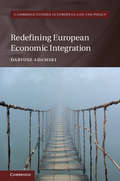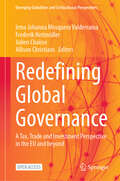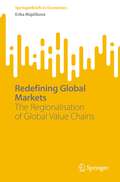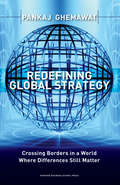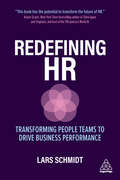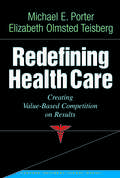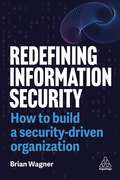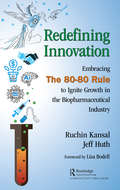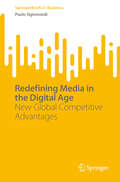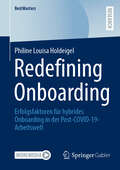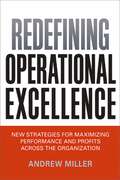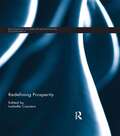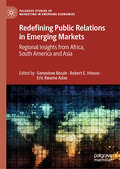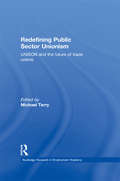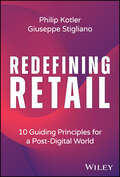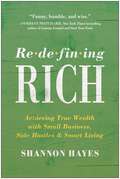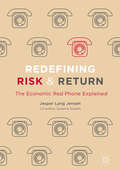- Table View
- List View
Redeeming Productivity: Getting More Done for the Glory of God
by Reagan RoseFeeling overwhelmed and unproductive? The answer isn&’t to do more. What image forms in your mind when you think of productivity? An assembly line? Spreadsheets? Business suits or workplace uniforms? In the ancient world, productivity didn't conjure images like these. Instead, it referred to crop yield and fruit bearing. This agrarian imagery helps us understand productivity through a biblical lens. Jesus taught, By this my Father is glorified, that you bear much fruit (John 15:8). Who doesn&’t want to have a truly productive life—to bear much fruit? But how does this happen in the places we hold dear—the home, workplace, and in our communities? We often feel overworked and overrun, defeated and discouraged. The world says be productive so that you can get all you can out of this life. The Bible says be productive so you can gain more of the next life. In Redeeming Productivity, author Reagan Rose explores how God&’s glory is the purpose for which He planted us. And he shows how productivity must be firmly rooted in the gospel. Only through our connection to Christ—the True Vine—are we empowered to produce good fruit. This book shows how we can maintain the vitality of that connection through simple, life-giving disciplines. Readers will discover manageable applications like giving God the first fruits of our days. Additionally, Reagan discusses how our perspective on suffering is transformed as we see trials as God&’s pruning for greater productivity.
Redeeming Time: Protestantism and Chicago's Eight-Hour Movement, 1866-1912
by William A. MirolaDuring the struggle for the eight-hour workday and a shorter workweek, Chicago emerged as an important battleground for workers in "the entire civilized world" to redeem time from the workplace in order to devote it to education, civic duty, health, family, and leisure. William A. Mirola explores how the city's eight-hour movement intersected with a Protestant religious culture that supported long hours to keep workers from idleness, intemperance, and secular leisure activities. Analyzing how both workers and clergy rewove working-class religious cultures and ideologies into strategic and rhetorical frames, Mirola shows how every faith-based appeal contested whose religious meanings would define labor conditions and conflicts. As he notes, the ongoing worker-employer tension transformed both how clergy spoke about the eight-hour movement and what they were willing to do, until intensified worker protest and employer intransigence spurred Protestant clergy to support the eight-hour movement even as political and economic arguments eclipsed religious framing. A revealing study of an era and a movement, Redeeming Time illustrates the potential--and the limitations--of religious culture and religious leaders as forces in industrial reform.
Redeeming Your Time: 7 Biblical Principles for Being Purposeful, Present, and Wildly Productive
by Jordan RaynorManage your time the way Jesus managed his with a biblical antidote to swamped to-do lists and hurried schedules.&“A highly practical road map.&”—Mark Batterson, New York Times bestselling author and lead pastor of National Community ChurchDespite the overwhelming amount of resources for time management and work-life balance, the ability to cultivate the efficiency and equilibrium needed to manage all our worthy pursuits can often feel frustratingly out of reach. The reason for our struggle is that productivity and time-management systems focus on individual habits rather than more meaningful and lasting lifestyle changes. But as it turns out, there is a better way to reach our full potential.We don&’t need just another approach to changing our habits. What we need is an operating system that takes into account the full scope of our lives. In these pages, bestselling author Jordan Raynor presents this system, using seven powerful time- management principles drawn from the example of how Jesus lived: 1. Start with the Word: Find meaningful connection with the author of time daily. 2. Let Your Yes Be Yes: Accept only the commitments you can fulfill. 3. Dissent from the Kingdom of Noise: Create room for silence, stillness, and reflection. 4. Prioritize Your Yeses: Confidently maintain your commitments. 5. Accept Your &“Unipresence&”: Focus on one important thing at a time. 6. Embrace Productive Rest: Live the God-designed rhythms of rest which are productive for our goals and souls. 7. Eliminate All Hurry: Embrace productive busyness while ruthlessly eliminating hurry from our lives.With these principles, you&’ll see how Jesus managed his time on earth and how he responded to human constraints much like the ones you face today. More than that, you&’ll discover corresponding practices that will help you embrace the best, most Christlike version of yourself possible: purposeful, present, and wildly productive.
Redeeming the Revolution: The State and Organized Labor in Post-Tlatelolco Mexico (The Mexican Experience)
by Joseph U. LentiA tale of sin and redemption, Joseph U. Lenti’s Redeeming the Revolution demonstrates how the killing of hundreds of student protestors in Mexico City’s Tlatelolco district on October 2–3, 1968, sparked a crisis of legitimacy that moved Mexican political leaders to reestablish their revolutionary credentials with the working class, a sector only tangentially connected to the bloodbath. State-allied labor groups hence became darlings of public policy in the post-Tlatelolco period, and with the implementation of the New Federal Labor Law of 1970, the historical symbiotic relationship of the government and organized labor was restored. Renewing old bonds with trusted allies such as the Confederation of Mexican Workers bore fruit for the regime, yet the road to redemption was fraught with peril during this era of Cold War and class contestation. While Luis Echeverría, Fidel Velázquez, and other officials appeased union brass with discourses of revolutionary populism and policies that challenged business leaders, conflicts emerged, and repression ensued when rank-and-file workers criticized the chasm between rhetoric and reality and tested their leaders’ limits of toleration.
Redefined Labour Spaces: Organising Workers in Post-Liberalised India
by Sobin George Shalini SinhaThis book discusses the transformation of labour movements and trade unionism in post-liberalised India. It looks at emerging collectivism, both in formal and informal sectors, and relates it to changing political and industrial relations. Bringing together studies of resistance, struggles and new forms of negotiations from different industries –agriculture, fisheries, brick kiln, plantations, IT, domestic workers, shipbreakers, sex workers, and miners –this book exposes the myths, realities and challenges that the present generation of workers in India face and struggle with. With contributions from leading thinkers in the field, the work deepens the understanding of the current Indian labour spaces, possibilities for contestations and articulations from below. The volume will be useful to students and researchers of labour studies, economics, sociology, development studies and public policy. It will be an invaluable resource to those engaged with industrial relations, trade unions, human rights, social exclusion as well as labour organisations and research institutions.
Redefining Business Models: Strategies for a Financialized World
by Nicholas Tsitsianis Colin Haslam Tord Andersson Ya Ping YinThe world has moved on in the advanced economies where credit based financial systems coupled with malleable accounting systems disconnect capitalization and wealth accumulation from GDP trajectories and financial surplus. This, the book argues, is the product of economic, financial and cultural imperatives that privilege and encourage financial leverage for wealth accumulation. This text re-works business models for a financialized world and presents a distinctive insight into the way in which national, corporate and focal firm business models have adapted and evolved. It also shows how, in the current financial crisis, financial disturbances can be amplified, transmitted and made porous, by accounting systems, threatening economic stability. By making visible the tensions and contradictions embedded in this process of economic development, the authors have constructed a loose business model conceptual framework that is also grounded in accounting. This is a valuable resource for practitioners, academics and policy makers with an interest in management, accounting and economic policy.
Redefining Development: Resolving Complex Challenges in Developing Countries (Elements in Public and Nonprofit Administration)
by Jessica KritzIn 2015, the Old Fadama slum of Accra, Ghana was a government 'no-go zone' due to the generally lawless environment. Participatory action researchers (PAR) began working with three stakeholders to resolve complex challenges facing the community and city. In three years, they created a PAR cross-sector collaboration intervention incorporating data from 300 research participants working on sanitation. In 2018–2019, the stakeholders addressed the next priorities: community violence, solid waste, and a health clinic. The PAR intervention was replicated, supporting kayayei (women head porters) in Old Fadama, the Madina slum of Accra and four rural communities in northern Ghana. The process expanded, involving 2,400 stakeholders and an additional 2,048 beneficiaries. Cross-sector collaboration worked where other, more traditional development interventions did not. This PAR intervention provides developing-country governments with a solution for complex challenges: a low-cost, locally-designed tool that dramatically improved participation and resulted in projects that impact the public good.
Redefining Development: Resolving Complex Challenges in a Global Context (Elements in Public and Nonprofit Administration)
by Jessica KritzIn 2015, Old Fadama, the largest informal community in Accra, was a government 'no-go zone.' Armed guards accompanied a participatory action research team and stakeholders as they began an empirical research project. Their goals: resolve wicked problems, advance collaboration theory, and provide direct services to vulnerable beneficiaries. In three years, they designed a collaboration intervention based on rigorous evidence, Ghana's culture and data from 300 core stakeholders. Sanitation policy change transformed the community, and government began to collaborate freely. By 2022, the intervention was replicated in Accra, Kumasi and eleven rural communities, providing health services to more than 10,000 kayayei (women head porters) and addressing complex challenges for 15,000 direct and hundreds of thousands of indirect beneficiaries. This collaboration intervention improved community participation, changed policy, and redefined development in theory and practice. This title is also available as Open Access on Cambridge Core.
Redefining European Economic Integration (Cambridge Studies In European Law And Policy)
by Dariusz AdamskiEuropean economic integration has relied on policies intended to make the European Union strong and resilient economically, socially and politically. The Eurozone crisis and Brexit have demonstrated, however, how fragile this hope was and how contested reforms to the major European economic policies have become.<P><P> Dariusz Adamski explains the evolution of these policies - from the Economic and Monetary Union to the internal market, international trade, the EU's climate policy, as well as its redistributive policies - and demonstrates how this evolution has made European economic integration increasingly frail. He shows how erroneous economic and political assumptions regarding the direction of the European integration project have interplayed with the EU's constitutional context. Arguing that flaws in individual policies contributing to European economic integration can be remedied in compliance with the existing constitutional setup, he explains why such solutions would be economically beneficial and politically feasible.<P> Demonstrates the relationship between national policies and the travails of European economic integration.<P> Explains which economic and political theories are useful in understanding the current state of European integration and which can serve as guidelines for reforming it.<P> Will appeal to readers with backgrounds in EU law, economics and politics alike.
Redefining Global Governance: A Tax, Trade and Investment Perspective in the EU and beyond (Emerging Globalities and Civilizational Perspectives)
by Julien Chaisse Irma Johanna Mosquera Valderrama Allison Christians Frederik HeitmüllerThis open access volume offers a unique interdisciplinary analysis of the current structure of global governance on tax, trade, and investment. It explores the interplay between actors, critiques current norm-making procedures, and proposes concrete solutions for improvement. It considers the impact of global governance in local contexts in Asia, Europe, and Africa, and includes perspectives from scholars based in these continents. It takes a comparative approach that goes beyond a siloed perspective to undertaking comparisons between the ways in which similar problems have been addressed in different areas---making the contributions highly relevant to scholars and policymakers worldwide. The volume includes case studies and provides concrete suggestions for improving global governance of tax, trade, and investment. This highly topical open access volume is of interest to a global readership in the fields of international law and taxation, globalization, international relations, and international trade economics.
Redefining Global Markets: The Regionalisation of Global Value Chains (SpringerBriefs in Economics)
by Erika MajzlíkováThis book analyses the possible regionalization of global value chains, particularly in manufacturing. Amidst calls for an industrial renaissance in Europe and a resurgence of manufacturing jobs in the United States, the dynamics of global value chains have been reshaped by global pandemics, geopolitical tensions, and increased automation. Employing a multi-regional input–output model, the book scrutinizes the decline in offshoring afer the mid-2010s. It sheds light on regionalization as a pivotal force redefining global markets, and focuses on Europe and North America, revealing the strengthening of regional ties. Discussing future challenges, the book will appeal to scholars, students, and researchers, as well as practitioners and policy-makers interested in a better understanding of (de)globalization nuances connected to the evolving role of manufacturing in global value chains.
Redefining Global Strategy
by Pankaj GhemawatWhy do so many global strategies fail-despite companies' powerful brands and other border-crossing advantages? Seduced by market size, the illusion of a borderless, "flat" world, and the allure of similarities, firms launch one-size-fits-all strategies.But cross-border differences are larger than we often assume, explains Pankaj Ghemawat in Redefining Global Strategy. Most economic activity-including direct investment, tourism, and communication-happens locally, not internationally.In this "semiglobalized" world, one-size-fits-all strategies don't stand a chance. Companies must instead reckon with cross-border differences. Ghemawat shows you how-by providing tools for:· Assessing the cultural, administrative, geographic, and economic differences between countries at the industry level and deciding which ones merit attention.· Tracking the implications of particular border-crossing moves for your company's ability to create value.· Creating superior performance with strategies optimized for adaptation (adjusting to differences), aggregation (overcoming differences), and arbitrage (exploiting differences), and for compound objectives.In-depth examples reveal how companies such as Cemex, Toyota, Procter & Gamble, Tata Consultancy Services, IBM, and GE Healthcare have adroitly managed cross-border differences-as well as how other well-known companies have failed at this challenge.Crucial for any business competing across borders, this book will transform the way you approach global strategy.
Redefining HR: Transforming People Teams to Drive Business Performance
by Lars SchmidtIn these times of change and disruption, HR must adapt, fast. But how can HR professionals critically assess their current processes and activities to identify what areas they need to think differently about in order to drive business results? This book provides the answers to enable all aspects of the people function to perform to their full potential.Redefining HR is a refreshing take on the evolution of the field of Human Resources and People Operations. It's an in-depth guide to the fundamental components of modern HR, and provides a tangible framework of progressive ideas and practices for HR practitioners, people leaders, and business executives. This is not a theoretical examination of HR. This is a book for practitioners, with insights from people professionals at the leading edge of HR's transformation from companies including Hubspot, Reddit, Stripe, Mastercard, Eventbrite, VaynerMedia, Asana.Written by a leading innovator in the HR industry, this book illuminates new perspectives and approaches for rethinking recruitment, talent management, performance and reward to save time, reduce costs and achieve greater business success. It covers key HR practices including diversity and inclusion, people analytics, learning and development (L&D) and employee experience and is supported by global case studies from organizations including Siemens, Upwork, CVS, Schneider Electric, Delivery Hero, and more. Redefining HR is an essential resource for all HR professionals business leaders wanting to create an exceptional people management function.
Redefining Health Care
by Michael E. Porter Elizabeth Olmsted TeisbergThe U.S. health care system is in crisis. At stake are the quality of care for millions of Americans and the financial well-being of individuals and employers squeezed by skyrocketing premiums-not to mention the stability of state and federal government budgets.In Redefining Health Care, internationally renowned strategy expert Michael Porter and innovation expert Elizabeth Teisberg reveal the underlying-and largely overlooked-causes of the problem, and provide a powerful prescription for change.The authors argue that competition currently takes place at the wrong level-among health plans, networks, and hospitals-rather than where it matters most, in the diagnosis, treatment, and prevention of specific health conditions. Participants in the system accumulate bargaining power and shift costs in a zero-sum competition, rather than creating value for patients. Based on an exhaustive study of the U.S. health care system, Redefining Health Care lays out a breakthrough framework for redefining the way competition in health care delivery takes place-and unleashing stunning improvements in quality and efficiency.With specific recommendations for hospitals, doctors, health plans, employers, and policy makers, this book shows how to move health care toward positive-sum competition that delivers lasting benefits for all.
Redefining Information Security: How to Build a Security-Driven Organization
by Brian WagnerRedefining Information Security shows security and technology leaders how to build a security-driven culture that not only safeguards but actively propels businesses forward, enabling innovation and growth in the face of an evolving digital business and threat landscape.This book pioneers a transformative approach that shields organizations from risks but also actively leverages them to drive competitive advantages. Redefining Information Security addresses the technical aspects of cybersecurity in addition to the organizational culture, leadership, communication, education and human factors that make up the integral components of a successful security strategy. It offers a strong emphasis on practical implementation, providing actionable guidance and tools to apply proactive security strategies.Redefining Information Security offers insights on integrating security into technology roadmaps and leveraging it as a growth catalyst. It introduces innovative risk management strategies, allowing organizations to navigate uncertainties while maintaining a robust security posture. This guide presents a wealth of real-word examples that provide insights into how organizations at the forefront of security innovation integrate and embed security within their strategic vision and explores how security can evolve to meet the challenges of tomorrow's digital landscape.
Redefining Innovation: Embracing the 80-80 Rule to Ignite Growth in the Biopharmaceutical Industry
by Ruchin Kansal Jeff HuthMost people marvel at the level of innovation demonstrated by the biopharmaceutical industry in bringing new products to the market – especially in the past 20 years. However, there is a crisis looming in the industry that should be a concern to all of us who take for granted the constant pace at which new treatments, and increasingly cures, have emerged from the laboratories of current sector incumbents. In the book, we examine the evolution of the biopharmaceutical industry to understand how it became what we term a "unicorn industry" with a unique, US-centered business model that has led to multiple blockbuster products (aka, unicorns) year after year. We explore how past success has created perceived barriers to innovation diversification beyond the chemical or biological-based biopharmaceutical product, and highlight the warning signs of the industry’s decline. We define a potential pathway for transforming the industry’s business model by broadening the definition, sources, and enablers of innovation beyond the traditional biopharmaceutical product. We introduce and advocate for the 80-80 Rule - "Being 80% confident that you will only be 80% right the first time should feel normal." The 80-80 Rule is a theme that emphasizes speed and willingness to embrace uncertainty and overcome internal barriers to change. It sets the standard for redefining innovation as a platform to reignite growth of the biopharmaceutical industry.
Redefining Media in the Digital Age: New Global Competitive Advantages (SpringerBriefs in Business)
by Paolo SigismondiThe global rise of streaming and social media platforms, and the influence of tech giants in increasingly more sectors of the economy including the media industry, have disrupted the status quo of the global media competitive landscape. This volume offers an insightful analysis of the profound changes in the competitive advantages in the media industry ushered in by digital convergence, and their ramifications. As Hollywood enters its second century, it faces novel challenges stemming from the digital revolution, which are greater, in magnitude and in impact, than any of those brought in by previous communication technology revolutions in the last century. These new challenges include the ascent of new competitors, leading conglomerates arising from the digital revolution, which as a result of the ever-expanding reach of digital convergence are successfully operating in the media sector as well. The new competitive dynamics are on display in the analysis of the streaming and social media landscapes. This book sheds light on the clash of two institutional logics within the new attention economy and its consequences on the competitive landscape. The legacy media institutional logics, represented by the legacy media conglomerates revolving around the Hollywood studios, which have established their primacy in the global mediascape for decades, now directly compete in the new landscape shaped by digital convergence with the digital media institutional logics identifying the tech giants emerging victorious from the digital revolution. The analysis utilizes the dichotomy between scripted and non-scripted media entertainment as a framework to assess the diverse competitive landscapes, business dynamics and their implications, of the different segments shaping the contours and boundaries of the media industry.
Redefining Onboarding: Erfolgsfaktoren für hybrides Onboarding in der Post-COVID-19-Arbeitswelt (BestMasters)
by Philine Louisa HoldeigelDer Übergang zu hybriden Arbeitsumgebungen aufgrund der Digitalisierung und der COVID-19- Pandemie führt zu Herausforderungen beim Onboarding neuer Mitarbeiter. Das veränderte Arbeitsumfeld nach Ende der Pandemie sowie der War for Talents verlangen von Unternehmen die Anpassung bestehender Prozesse, um neue Mitarbeiter ab Unternehmenseintritt erfolgreich und langfristig zu binden. Die Autorin identifiziert Herausforderungen und Erfolgsfaktoren für hybrides Onboarding von Wissensarbeitern, um Anpassungen des Onboardings an den hybriden Onboardingkontext zu optimieren. Die Ergebnisse von Experteninterviews deuten darauf hin, dass sich Erfolgsfaktoren für hybrides Onboarding in fünf Bereiche strukturieren lassen, die sich in der Literatur wiederfinden: Compliance, Clarification, Culture, Connection und Process. Dabei sind speziell für den hybriden Onboardingkontext die Herausforderungen Technik und soziale Distanz gültig und folglich diejenigen Faktoren für das hybride Onboarding relevant, welche die Herausforderungen bewältigen: Den persönlichen Kontakt vor Ort nutzen, digitale Lösungen, insbesondere für die fachliche Einarbeitung integrieren und die Kombination der Arbeitsorte flexibel einsetzen. Die Arbeit attestiert dynamische Weiterentwicklungen für hybrides Onboarding in der Zukunft.
Redefining Operational Excellence: New Strategies for Maximixing Perforamnce and Profits Across the Organization
by Andrew MillerThe old definition of operational excellence is a relic. Our world is too complex, too interconnected, and too fast-moving for organizations to achieve dramatic results simply by eliminating waste and increasing standardization. After all, no company ever cut their way to sustainable growth. True operational excellence is not about "lean" or six sigma or any other methodology. Operational excellence is a mindset, and it achieves breakthrough results. It requires a company culture that questions current models and focuses on adding value, making improvements, and increasing speed. Operational excellence is about finding money and performance boosts in areas businesses don't normally look. Redefining Operational Excellence covers it all--processes, people, and operations--and shares specific strategies to: Drive innovation and collaboration Engage customers Attract and retain top people Align strategy and execution Optimize speed And more Operational excellence is the relentless pursuit of doing things better. This revelatory guide presents a groundbreaking way of doing things that will benefit organizations and their customers.
Redefining Prosperity (Routledge Studies in Ecological Economics)
by Isabelle CassiersSociety today faces a difficult contradiction: we know exactly how the physical limits of our planet are being reached and exactly why we cannot go on as we have before – and yet, collectively, we seem unable to reach crucial decisions for our future in a timely way. This book argues that our definition of prosperity, which we have long assimilated with the idea of material wealth, may be preventing us from imagining a future that meets essential human aspirations without straining our planet to the breaking point. In other words, redefining prosperity is a necessary and urgent task. This book is the fruit of a long debate among 15 scholars from diverse fields who worked together to bring the depth and nuance of their respective fields to questions that affect us all. The result is a rich, transdisciplinary work that illuminates the philosophical and historical origins of our current definition of prosperity; identifies the complex processes that gave rise to the problems we face today; elucidates the ways in which our contemporary environmental, social, nutritional, economic, political, and cultural crises are interconnected; and explores why a half-century of economic growth has neither increased life satisfaction in the West nor vanquished world poverty. Approaching these broad-ranging questions from the specific standpoints of their disciplines, each of the authors offers thoughts for the future, considering possible escape routes and proposing changes to the way we live, behave, and organise society and public action – changes that actually respond, in an equitable way, to our deepest aspirations. Ultimately, in laying the groundwork for a public debate on this subject, this book poses a question to its readers: what is your definition of prosperity, and what can be done to promote it?
Redefining Public Relations in Emerging Markets: Regional Insights from Africa, South America and Asia (Palgrave Studies of Marketing in Emerging Economies)
by Robert E. Hinson Eric Kwame Adae Genevieve BosahThis book explores the dynamics of public relations (PR) in emerging economies across Africa, South America, and Asia. Offering an in-depth examination of the cultural, political, and media landscapes that define PR practices in these regions, chapters highlight innovative approaches, challenges, and opportunities for both scholars and practitioners. The authors explore the unique ways organisations address ethical dilemmas, respond to crises, and leverage purpose-driven campaigns to build trust and safeguard reputations. Offering insights into the integration of digital tools and AI in PR, the book explores the evolution of gender dynamics in leadership, the role of PR in addressing socio-environmental crises and stakeholder engagement. A valuable resource for PR practitioners, academics, and students, this book bridges global trends with local adaptations, offering practical guidance and a thought-provoking analysis on the exciting and complex world of public relations in emerging economies.
Redefining Public Sector Unionism: UNISON and the Future of Trade Unions (Routledge Research in Employment Relations)
by Michael TerryThis book brings together contributions from both expert academics and leading figures of UNISON in an in-depth analysis of the union's achievements to date. As the largest and most influential trade union in the public sector, UNISON is an ideal case-study for the possible future development of UK unions in the twenty first century.
Redefining Retail: 10 Guiding Principles for a Post-Digital World
by Philip Kotler Giuseppe StiglianoDiscover the new realities of working in the post-digital era of consumer brand and retail marketing. In Redefining Retail: 10 Guiding Principles for a Post-Digital World, renowned international marketers Prof. Philip Kotler and Dr. Giuseppe Stigliano deliver a timely and insightful examination of retail and consumer brand marketing. In the book, you’ll find practical and concrete techniques for redefining your organisation’s internal operations and processes, as well as its business strategy. You’ll rethink the entire value chain as you consider the growing importance of sustainability, diversity and inclusion, working policies, and more. The authors describe ten critical principles that should guide the actions of your company, whether you work with a startup, an SME, or a large, established organization. They also discuss: The main challenges retailers face in a world that’s been fundamentally transformed by the digital revolution. How to future-proof your marketing strategy, including 10 guiding principles for a new customer experience at retailers and consumer brands. The opportunities and threats of creating a seamless customer journey in the physical, digital, and virtual realms. Perfect for managers, entrepreneurs, consultants, and investors in both the B2B and B2C sectors, Redefining Retail: 10 Guiding Principles for a Post-Digital World will also prove invaluable to students of management, marketing and business administration, as well as anyone with an interest in the evolution of commerce.
Redefining Rich: Achieving True Wealth with Small Business, Side Hustles, and Smart Living
by Shannon Hayes2022 NATIONAL INDIE EXCELLENCE AWARD FINALIST — BUSINESS, ENTREPRENEURSHIP, & SMALL BUSINESS 2022 AXIOM BOOK AWARD BRONZE MEDALIST — ENTREPRENEURSHIP/SMALL BUSINESS NAUTILUS BOOK AWARD SILVER WINNER — BUSINESS & LEADERSHIP &“Redefining Rich is inspiring, thought-provoking, and highly recommended both as a fascinating story in its own right and as a call to reconsider what one truly aspires to in life.&” —Midwest Book Review In our dysfunctional economy, &“success&” often comes at great personal cost . . . we&’re tired, we&’re stressed out, and we have no time for family and friends. It&’s time to redefine &“rich.&” From a third-generation farmer and successful entrepreneur, Redefining Rich is an entrepreneur&’s guide to balancing work and family with the pleasures of the good life, with simple exercises and important lessons to serve everyone from the new sole proprietor to a seasoned CEO. Shannon Hayes was in the final months of her PhD program, recently engaged, and beginning to plan her future. Having grown up on a northern Appalachian sheep farm, she had two advantages: a hard-won education and hillbilly pragmatism. But when it came time to enter the job market, Hayes made a tough discovery: the economy just doesn&’t work. It doesn&’t work for women, for free thinkers, for the working class, or for white-collar professionals. It doesn&’t work in rural America, much less in the cities and the suburbs. It forces us to choose between career and family, profit and creativity. So, Hayes and her husband walked away from their career paths and chose to forge a life on her family&’s frost-plagued mountain farm, starting up a small café in town. Together, they found their sweet spot: a place where the Appalachian farm culture and sensibilities she and her community have lived by helped them thrive, even in a tough economic environment. Against the odds, the Hayes family built a business that lets them live abundantly, spend time with family, and enjoy the gifts of nature. And the business even helped reinvigorate their chronically economically depressed town. But the journey to this point was rife with challenges, tumbles, and mistakes. With humor, lively stories, and assurance, Hayes reveals the best lessons she&’s learned for taking an alternate path, whether it lies in rural America, in the &‘burbs, or the heart of the city. She outlines the fundamentals of sustainable wealth, how to develop income streams, get organized, bring family into the business, ask for fair prices and market efficiently, and—the most important lesson of all—set personal boundaries and say &“no&” even while sustaining relationships. Hayes shows entrepreneurship is the means to build sustainable communities, keep families together, and foster great creative fulfillment. Redefining Rich will comfort, instruct, amuse, and inspire those of us who are trying to make our lives work in untraditional ways.
Redefining Risk & Return
by Jesper Lyng Jensen Susanne SublettThis book is the first attempt to re-define objective risk. It addresses the cost of running out of capital as a generalized cost syndrome and explains how it is possible to describe this cost in such a way as to give it practical, real-life significance for personal finances, company finances and the economy as a whole. The discussion begins by presenting an intuitive and useful definition of risk: the probability of prospective capital shortfall. From this point it establishes a risk theory and expands the work of major thinkers such as Frank Knight and John Maynard Keynes, and adds reserve capital as a new financial risk management tool, with an economic function that is different from savings. This book will be of interest to economists, politicians, and decision makers as well as to the general public.
